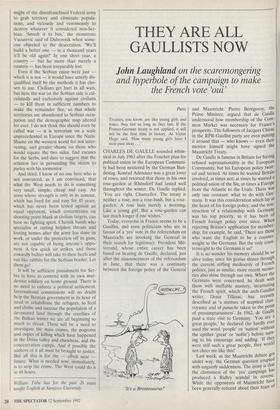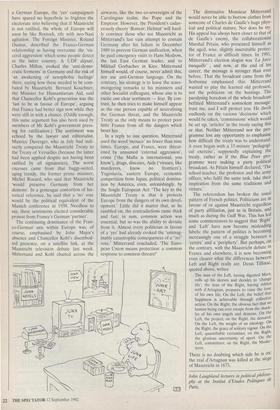THEY ARE ALL GAULLISTS NOW
John Laugh/and on the scaremongering
and hyperbole of the campaign to make the French vote 'our
Paris
Treaties, you know, are like young girls and roses: they last as long as they last. If the Franco-German treaty is not applied, it will not be the first time in history. As Victor Hugo said, 'How many Young girls have I seen pass away. ... '
CHARLES DE GAULLE sounded whim- sical in July 1963 after the FoUchet plan for political union in the European Communi- ty had been neutered by the German Bun- destag. Konrad Adenauer was a great lover of roses, and retorted that those in his own rose-garden at Rhondorf had lasted well throughout the winter. De Gaulle replied, 'You are right, Chancellor. The treaty is neither a rose, nor a rose-bush, but a rose- garden. A rose lasts merely a morning. Like a young girl. But a rose-garden can last Much longer if one wishes.'
Today, everyone in France seems to be a Gaullist, and even politicians who are in favour of a 'yes' vote in the referendum on Maastricht are invoking the General in their search for legitimacy. President Mit- terrand, whose entire career has been based on beating de Gaulle, declared, just after the announcement of the referendum in June, that there was a continuity between the foreign policy of the General 'It's a Brontesaurus!' and Maastricht. Pierre Beregovoy, the Prime Minister, argued that de Gaulle understood how membership of the Com- mon Market was necessary for France's prosperity. The followers of Jacques Chirac in the RPR-Gaullist party are even putting it around that — who knows — even their mentor himself might have signed the Maastricht Treaty.
De Gaulle is famous in Britain for having refused supranationality in the European Community, but his European policy twist- ed and turned. At times he wanted Britain involved, at times not; at times he wanted a political union of the Six, at times a Europe from the Atlantic to the Urals. There was only one constant: what to do with Ger- many. It was this consideration which lay at the heart of his foreign policy, and the con- struction of a relationship with Germany was his top priority, as it has been of French foreign policy ever since. When rejecting Britain's application for member- ship, for example, he said, 'There are those who want the English to be a counter- weight to the Germans. But the only coun- terweight to the Germans is us!' It is no wonder his memory should be so alive today, since his genius shines through the current stifling mediocrity of French politics, just as similar, more recent memo- ries also shine through our own. Where the Germans were concerned, he dealt with them with ineffable mastery, incarnating the French spirit, which the arch-Gaullist writer, Denis Tillinac, has recentlY described as 'a mixture of sceptical clair- voyance and of panache taken to the point of presumptuousness'. In 1962, de Gaulle paid a state visit to Germany. 'You are a great people,' he declared (he hardly ever used the word 'people' or 'nation' without the epithet 'great' or 'noble') before pott- ing to his entourage and adding, 'If theY were still such a great people, they would not cheer me like this!'
Last week, as the Maastricht debate got under way, the German question erupted with ungainly suddenness. The irony is that the clumsiness of the 'yes' campaign has produced a Ridley scandal in reverse. While the opponents of Maastricht have been generally reticent about their fears of a German Europe, the 'yes' campaigners have spared no hyperbole to frighten the electorate into believing that if Maastricht is not ratified, the whole of Europe will soon be like Rostock, rife with neo-Nazi agitation. The Foreign Minister, Roland Dumas, described the Franco-German relationship as having overcome the 'vis- ceral aggression' which some people detect in the latter country. A UDF depute, Charles Millon, evoked the 'anti-demo- cratic ferments' in Germany and the risk of 'an awakening of xenophobic feelings' there, saying how these needed to be com- bated by Maastricht. Bernard Kouchner, the Minister for Humanitarian Aid, said that Chancellor Kohl's generation was the 'last to be in favour of Europe', arguing that France had better sign now while they were still in with a chance. (Oddly enough, this same argument has also been used by members of Mr Kohl's government press- ing for ratification.) The sentiment was echoed by the lawyer and editorialist, Maurice Duverger, who in July had indi- rectly compared the Maastricht Treaty to the Treaty of Versailles (because the latter had been applied despite not having been ratified by all signatories). The worst excesses came from that baggy-suited, aging trendy, the former prime minister, Michel Rocard, who said that Maastricht 'would preserve Germany from her demons'. In a grotesque contortion of his- torical reference, he said that a `no' vote would be the political equivalent of the Munich conference in 1938. Needless to say, these sentiments elicited considerable protest from France's German 'partner'.
The continuing dominance of the Fran- co-German axis within Europe was, of course, emphasised by John Major's absence and Chancellor Kohl's disembod- ied presence, on a satellite link, at the Maastricht television debate last week. Mitterrand and Kohl chatted across the
airwaves, like the two co-sovereigns of the Carolingian realm, the Pope and the Emperor. However, the President's cadav- erously cheery `Bonsoir, Helmut' will hard- ly convince those who see Maastricht as Mitterrand's last vain attempt to contain Germany after his failure in December 1989 to prevent German unification, when he paid emergency visits to Hans Modrow, the last East German leader, and to Mikhail Gorbachev in Kiev. Mitterrand himself would, of course, never admit this, nor use anti-German language. On the contrary, his strategy is to leave the scare- mongering remarks to his ministers and other Socialist colleagues, whose aim is to excite one clear sentiment — fear. By con- trast, he then tries to make himself appear as the one person capable of neutralising the German threat, and the Maastricht Treaty as the only means to protect poor little France from all the dangers which beset her.
In a reply to one question, Mitterrand used the word 'menace' no fewer than nine times. Europe, and France, were threat- ened by unnamed 'external aggression', crime ('the Mafia is international, you know'), drugs, diseases, Aids ('viruses, like murderers, know no frontiers'), Yugoslavia, eastern Europe, economic competition from Japan, political domina- tion by America, even, astonishingly, by the Single European Act: 'The key to the Maastricht Treaty is that it protects Europe from the dangers of its own devel- opment.' Little did it matter that, as he rambled on, the contradictions came thick and fast; in sum, common action was essential, but so was the ability to deviate from it. Almost every politician in favour of a 'yes' had already evoked the 'unimag- inably catastrophic consequences of a "no" vote.' Mitterrand concluded, 'The Euro- pean Union means protection: a common response to common threats!'
The diminutive Monsieur Mitterrand would never be able to borrow clothes from someone of Charles de Gaulle's huge phys- ical and political stature. Nor does he try. His appeal has always been closer to that of de Gaulle's enemy, the collaborationist Marshal Main, who presented himself as the aged, wise, slightly inscrutable protec- tor of France in difficult times. In 1981, Mitterrand's election slogan was 'La force tranquille' , and now, at the end of his career, the message is stronger than ever before. That the broadcast came from the Sorbonne emphasised this: Mitterrand wanted to play the learned old professor, not the politician on the hustings. The paralysing boredom of the whole broadcast befitted Mitterrand's somnolent message: trust me, and I will protect you. He dwelt endlessly on the various 'decisions' which would be taken, 'commissions' which would be set up, 'articles' in the treaty saying this or that. Neither Mitterrand nor the pro- gramme lost any opportunity to emphasise how difficult the treaty was to understand: it even began with a 15-minute 'pedagogi- cal exercise', supposedly explaining the treaty, rather as if the Blue Peter pro- gramme were making a party political broadcast. As Petain himself declared, 'The school-teacher, the professor and the army officer, who fulfil the same task, take their inspiration from the same traditions and virtues.'
The referendum has broken the usual pattern of French politics. Politicians are in favour of or against Maastricht regardless of party affiliation, just as in Britain, and much as during the Gulf War. This has led some commentators to suggest that 'Right and 'Left' have now become misleading labels: the pattern of politics is becoming increasingly one of a struggle between a 'centre' and a 'periphery'. But perhaps, on the contrary, with the Maastricht debate in France and elsewhere, it is now becoming even clearer what the differences between Left and Right really are. Denis Tillinac, quoted above, writes:
The man of the Left, having digested Marx, rolls up his sleeves and decides to 'change life'; the man of the Right, having ridden with d'Artagnan, prepares to raise the tone of his own life. On the Left, the belief that happiness is achievable through collective action. On the Right, the obvious fact that no human being can ever escape from the shack- les of his own angels and demons. On the Left, the project; on the Right, the demand. On the Left, the weight of an ideology. On the Right, the grace of solitary vigour. On the Left, quantifiable certainties; on the Right, the glorious uncertainty of sport. On the Left, committees; on the Right, the Muske- teers.
There is no doubting which side he is on: the real d'Artagnan was killed at the siege of Maastricht in 1673.
John Laughland lectures in political philoso- phy at the Institut d'Etudes Politiques de Paris.



































































 Previous page
Previous page